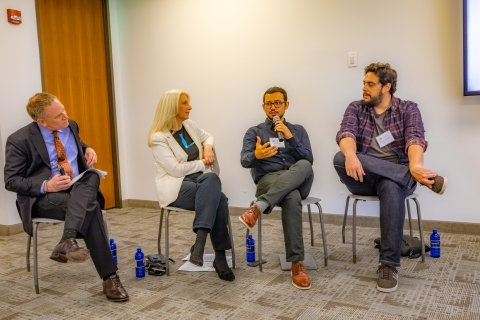
Looking for innovative solutions to fight the scourge of disinformation? Our ICFJ Fellows have come up with three strategies:
- Help verified facts find their audience as quickly as false stories spread
- Restore trust in news media by showing the positive impact of fact-based reporting
- Empower independent voices
These emerged at a panel discussion at Knight Foundation in Miami that highlighted how media innovators are tackling the problem in Latin America’s largest country, Brazil.
The panelists, ICFJ Knight Fellows Pedro Burgos and Janine Warner, and ICFJ TruthBuzz Fellow Sérgio Spagnuolo, shared their approaches:
To counter the spread of bogus stories, Burgos, who is based in Sao Paulo, has helped Brazilian fact-checking news site Aos Fatos build bots to alert social media users on Twitter and Facebook when they have shared a story with false information.
The bot searches for social posts that link to discredited stories online. When it finds one, it automatically replies with a short message and a link to verified information. Most people who have been alerted this way click the link, and some have also corrected their posts. A few have even thanked the bot.
More challenging is to combat the spread of false information on closed chat networks such as WhatsApp, which is enormously popular in Brazil, said Sao Paulo-based Spagnuolo. As part of his ICFJ TruthBuzz Fellowship, Spagnuolo led a survey of news consumers in Brazil last year. The survey found that one in four Brazilians accesses news on WhatsApp, where misinformation spread quickly in the runup to the election. Spagnuolo also drafted guidelines for WhatsApp posts, which Folha de Sao Paulo, Brazil’s largest newspaper, adopted in sharing its stories on the chat platform.
Few newsrooms track the effects of their reporting on the communities and societies they serve, Burgos said. But when they do, they can foster renewed trust in journalism institutions.
With support from Google News Initiative, Burgos and his team built a platform called Impacto to help automate impact-tracking for newsrooms. So far, his partners in Brazil have collected more than 1,000 impacts, which the newsrooms are beginning to share with the public.
Burgos thinks that tracking impact has the most potential at the local level, where news is often less polarized than at the national level. “Improving something like the conditions at a community hospital is a nonpartisan issue,” he said.
In many countries, journalism entrepreneurs are the only source of news that is not heavily influenced by the government, said ICFJ Knight Fellow Janine Warner. That’s why Warner, who is based in Los Angeles, and Mijal Iastrebner, who is based in Buenos Aires, founded SembraMedia, which trains independent news entrepreneurs in the region to survive and even thrive.
Learn more about ICFJ Fellows Spagnuolo, Burgos and Warner.